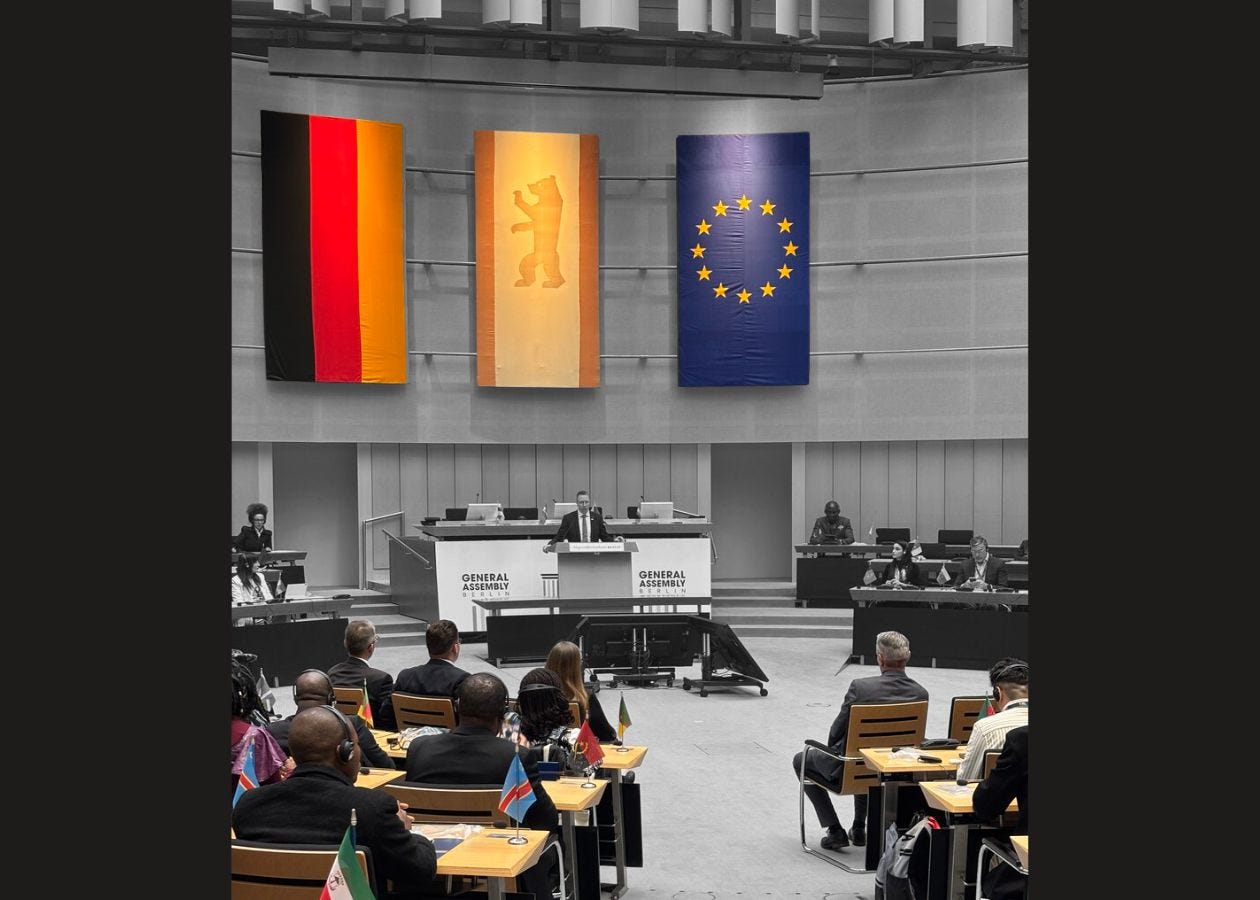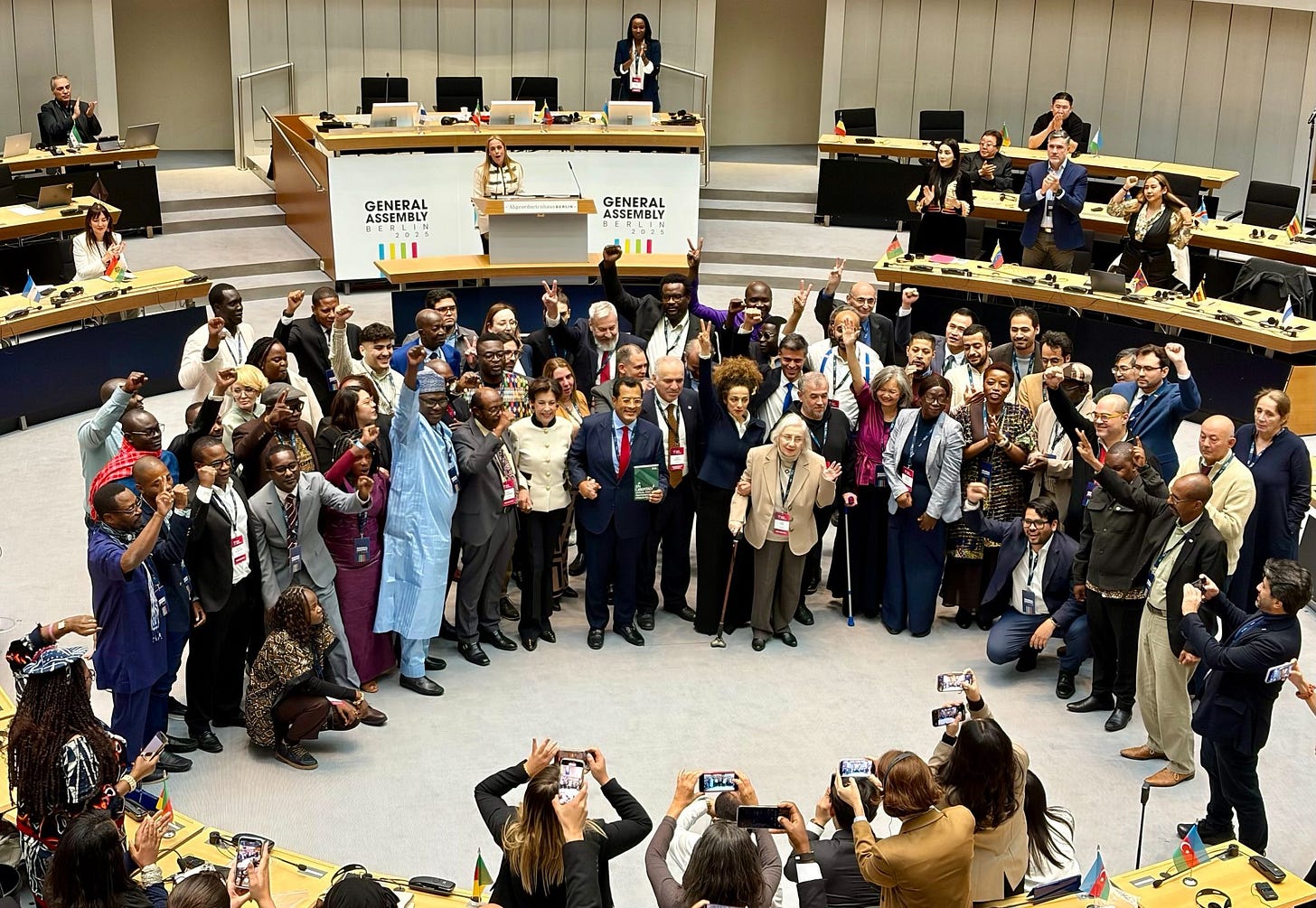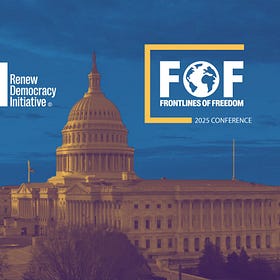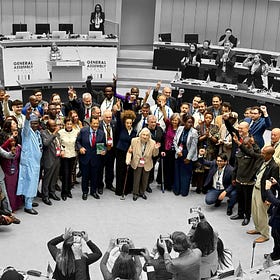Jay Nordlinger is a senior resident fellow at the Renew Democracy Initiative and a contributor at The Next Move.
Author’s Note: The World Liberty Congress took place in Berlin on November 8 and 9. Part I of this journal-style report is here. It includes a longer explanatory note. This journal will conclude today. Soon, I will have notes from the opening day of Berlin Freedom Week, which immediately followed the Congress.
If you ever have the chance to be around Paul Rusesabagina—take it. He is a gentle, and strong, soul. He once planned to be a pastor. He is a kind of pastor nonetheless.
He comes from Rwanda, and saved many in the genocide (1994). Ten years later, he was depicted in the movie Hotel Rwanda. The next year, George W. Bush bestowed the Presidential Medal of Freedom on him.
Fifteen years later, at age 66, Rusesabagina was taken prisoner by the Rwandan dictatorship.
There is a great deal to say. For a piece of mine about this man, published last year, go here. In any event, Rusesabagina is here in Berlin, for the World Liberty Congress. So are his daughters, Anaïse and Carine.
The latter, in fact, is an official of the WLC: its spokesman.
***
I have long been bothered by the name “Democratic Republic of the Congo,” to refer to that nation under dictatorship: an unspeakably brutalized nation. I have to smile, therefore, when a delegate of the WLC refers to the country as the “Autocratic Republic of the Congo.”
You remember the old joke about the GDR, don’t you? The German Democratic Republic, otherwise known as “East Germany”?
“It’s three lies in one. It’s not a republic. It’s not democratic. And it is scarcely German, being dictated to by Moscow.”
***
I meet a man from South Sudan, Cirino Hiteng Ofuho. Where did he get that Italian first name? “From Italian missionaries!” he tells me.
He further tells me about PAD, which I am glad to know about: the Platform for African Democrats.
I think of George Ayittey, the late Ghanaian economist. He summed up his point of view in a single, short sentence: “Africa is poor because she is not free.”
Simple and, I believe, true.
***
WLC luminaries are having a group portrait taken. The photographer is fascinating, as he gives directions: Turn slightly. Place your weight on your right side. Cross your arms. He is a classic New Yorker, as he goes about his work.
“Who is this guy?” I ask a woman standing near me. She says, “He’s the most famous photographer in Europe, Michael Somoroff. He’s also a film director.”
I can tell. (For the Wikipedia entry on Somoroff, go here. His father, Ben, was also a well-known photographer, who had his studio on E. 54th St.)
***
María Corina Machado addresses the Congress by video hookup. She is in hiding in her country, Venezuela. She is the leader of the democratic opposition. Last month, the Norwegian Nobel Committee announced that it was awarding her its peace prize (to be presented on December 10).
(For this site, The Next Move, Uriel Epshtein wrote a piece about the prize to Machado, and so did I. Both pieces can be found here.)
Like Masih Alinejad, María Corina Machado emphasizes that democrats, wherever they live, should help and support one another.
“Our enemies cooperate,” she tells the World Liberty Congress. “They share their money, their guns, their propaganda. So we must also cooperate.”
She winds up, “They build prisons; we build faith. They spread fear; we spread truth. And in the end, truth always wins.”
***
Natalia Pelevina is a Russian politician—democratic and anti-Putin. So is she in prison or in exile? She is in exile. For the World Liberty Congress, she is the regional secretary for Russia, Eastern Europe, and Central Asia.
She gives a report, mainly about the human rights abuses in the various countries of that region. And finally she gets—movingly, I must say—to the Ukraine war.
“Russia has continued its horrific, criminal war against Ukraine,” she says. She gives some hideous, important details—about the mass kidnapping and deportation of children, for example.
And she says, “The world cannot abandon Ukraine, because if we do, we have failed as humanity.”
***
Pelevina then introduces a young woman from Belarus, Nia Gladenkaya—who is serving in the Ukrainian armed forces. She, too, speaks of war crimes in Ukraine: “a systematic campaign” of such crimes. She has seen them up close. And she has a warning.
If the Putin regime “survives this war without real consequences,” it will be a dark, dark time for many countries, as tyrants and aggressors will see that they can get away with murder, and the invasion of neighbors, etc.
The democratic world, says Nia Gladenkaya, among others, must draw the line at Ukraine.
***
At some point in the proceedings, a somber roll is called: the roll of delegates (as I understand it) currently in prison. They are Succès Masra, of Chad; Jesús Armas, of Venezuela; Foniké Menguè, of Guinea; Victoire Ingabire, of Rwanda; Theary Seng, of Cambodia; Tundu Lissu, of Tanzania; and Kizza Besigye, of Uganda.
***
Many, many of the delegates here are former political prisoners—and future political prisoners?—and many have been detained at least once in their lives. They have gathered for a picture, these former political prisoners and detainees:
***
As I said earlier in this journal, the leadership of the WLC have “rotated out.” New leaders have been elected, by their fellow delegates. (Many of the delegates have never before had the experience of voting in an honest election.)
The new president is Félix Maradiaga, of Nicaragua. The new vice president is Shukria Barakzai, of Afghanistan. The secretary-general: Carine Kanimba, of Rwanda (who is one of Paul Rusesabagina’s daughters). Spokesman: Chemi Lhamo, a Tibetan-Canadian activist. And ombudsman: Andrei Sannikov, of Belarus.
Each of these people—hell, each of the 180 delegates—has an interesting and important story to tell. About Félix Maradiaga, I wrote two years ago: here. And I will never forget meeting Andrei Sannikov for the first time, in 2021.
I knew the abuses he had suffered in prison. Let me be less dainty: he was tortured almost to death. I told him I was so happy to see him alive and well, and standing and laughing.
He told me, “I once met on the street someone I had been in prison with. He looked at me and said, ‘You’re alive!’”
Masih Alinejad once greeted me in similar fashion, by the way. Her opening words were, “I’m still alive!”
***
Chemi Lhamo says something amusing. Though she is the Congress’s spokesman, she pledges to listen. That’s not the amusing part. She quotes her mother, who is known to say, “You have two ears and one mouth for a reason.”
Also, the new spokesman leads the assembly in a chant of “The people united will never be defeated!” I have to smile a little—because when I was coming of age, that was a lefty slogan, chanted by supporters of Fidel Castro and Che Guevara.
But it perhaps has a certain universality...
***
The World Liberty Congress has come up with a document, which it calls the “Berlin Manifesto.” I will quote just a portion: “Ukraine today is the frontline of the global fight for liberty. We call upon democracies to go ‘all in’ on supporting Ukraine...”
They have their eyes open, these people. Given their experiences, it can hardly be otherwise
Strength to their hands.
More from The Next Move:
Join the Renew Democracy Initiative in DC, Dec. 9-10
The Frontlines of Freedom Conference is about fostering a culture of freedom.
At the World Liberty Congress, Part I
The first installment in Jay Nordlinger’s reflections on a meeting of dissidents in Berlin.








That was interesting and fascinating, Jay, thank you.
“You remember the old joke about the GDR, don’t you? The German Democratic Republic, otherwise known as “East Germany”?”
The rhythm of that saying about the GDR reminded me of Voltaire on the Holy Roman Empire. It may not have been holy or Roman or an empire, but it was pretty darned German.